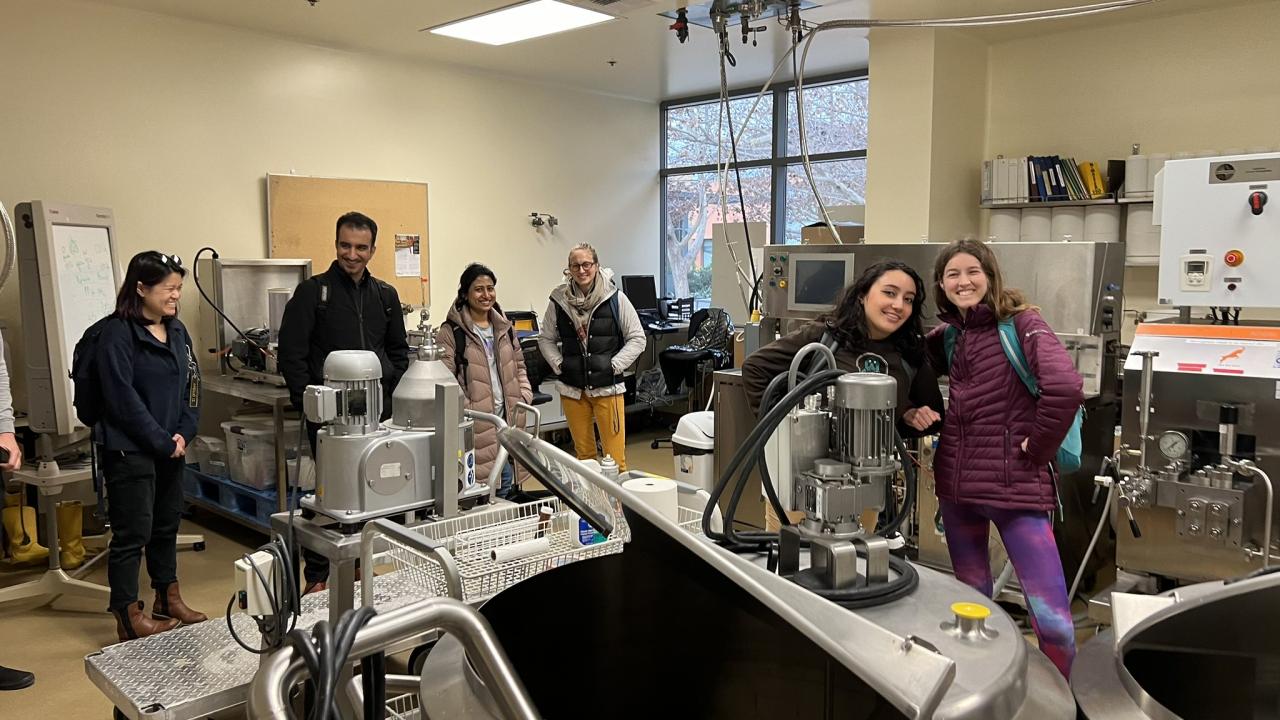
Annual Student Rally Connects Students to Local Research and Industry

Water. Soil. Energy. Air. The modern world revolves around these basic resources that we take for granted to create necessities like food, fuel and fiber. As the next generation of scientists, engineers, and professionals, it is our job to ensure our future is stable and plentiful by learning, creating and teaching sustainable practices in resource management and the production of necessary goods.
My name is Ian Nielsen, and I'm a third-year Ph.D. student and Graduate Student Association president in the Department of Biological and Agricultural Engineering at the University of California, Davis. Originally from Berkeley, California, I earned my B.S. in electrical engineering at Cal Poly San Luis Obispo, where I first truly became enamored of agriculture and biology by helping lead the campus aquaponics club.
I then worked at the USDA Agricultural Research Service Bioproducts Research Unit, or ARS BRU, in Albany, California, where I learned the potential value that agricultural waste residues hold. With this knowledge and the drive to make a positive impact in the world, I embarked on my journey into graduate school here in Davis. I currently work under Ruihong Zhang, professor of biological and agricultural engineering, in the Bioenvironmental Engineering Lab, where I focus on waste residues in anaerobic digestion and biofertilizer production.
Before coming to UC Davis, I joined the American Society of Agricultural and Biological Engineers, or ASABE, which aims to maintain a global network of professionals to engineer a sustainable future.
Rallying for Research
Five years ago, the California/Nevada section of ASABE began organizing student rallies to engage students and young professionals from the area with local professionals and opportunities in academia, research, government and industry, with UC Davis hosting the inaugural rally. In January, UC Davis hosted the fifth instance of the rally, and I had the honor of being the rally president. This year we had over 50 attendees from colleges and industries throughout California.
On-campus tours included the BAE department research facilities in Bainer Hall and the Western Center for Agricultural Engineering where graduate students and faculty, including myself, presented their research and workplaces. These presentations included research on closed environment agriculture, food, plastic, and fertilizer production, gene editing applications, biomass drying and more.
We also toured several labs in the Robert Mondavi Institute, or RMI, for Wine and Food Science. At the winery research center, we learned about how automation is being used to monitor and produce experimental wines. At RMI, we also visited a milk production laboratory that is being used to produce high-protein almond milk and a tomato processing plant that houses one of the only operational peach pitting machines in California.
Engaging with Industry
Local industry tours included a visit to Meridian Jacobs, a heritage breed sheep farm in Dixon, where we learned about the wool and fiber production processes with a live loom and fiber spinning wheel demonstration, as well as sustainable pasture irrigation design. Afterward, we stopped by Ruhstaller Farm and brewery in Dixon to learn about its natural farm management practices, hops-growing operations and fermentation processes.


Students learn about wool and fiber production processes with a live loom and fiber spinning wheel demonstration at Meridian Jacobs heritage breed sheep farm in Dixon. (Courtesy of Fadi Fathallah)
Later, we visited Lystek, a company in Fairfield that takes biosolids from several wastewater treatment plants in California and processes them with high temperatures, pressure and pH along with intense grinding to create Class-A biosolids fertilizer, which they then land apply — by either spreading the fertilizer on the soil surface or injecting it into the soil — throughout California to aid carbon sequestration.
Finally, we visited the USDA ARS BRU in Albany, where we toured the facility and learned about current research projects, including American-grown natural rubber plants and products, organic waste residue-derived and compostable bioplastics, healthy popped oat snacks and gene editing programs for essential crops such as wheat.
This rally also included a career panel featuring local professionals from the fields of irrigation, biotechnology, fiber production, fertilizer production and more. Other fun events included bowling at the UC Davis Memorial Union and an engineering design competition where students competed by building catapults from basic school supplies.
We also enjoyed great food from local restaurants and caterers. I would like to say a huge thank you to the sponsors and organizers of this year's rally. Without them, we would not have been able to host such a successful event.
Growing Our Community
I look forward to the upcoming ASABE gatherings. The CA/NV section of the ASABE will also host the Annual International Meeting, or AIM, in Anaheim on July 28-31, where researchers and industry professionals from around the world gather to network and present their research and projects. Next year, the sixth annual CA/NV section student rally is set to be hosted by Cal Poly SLO, where we hope to host even more students and young professionals from the CA/NV area.
